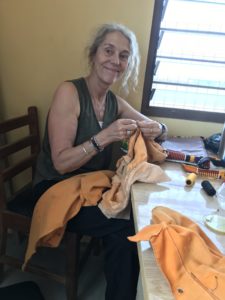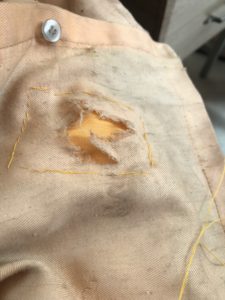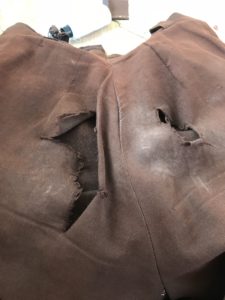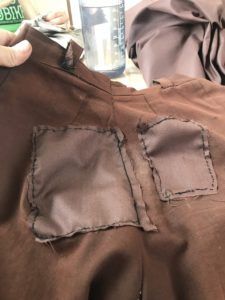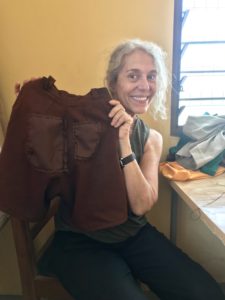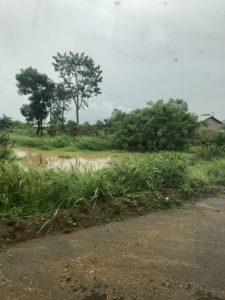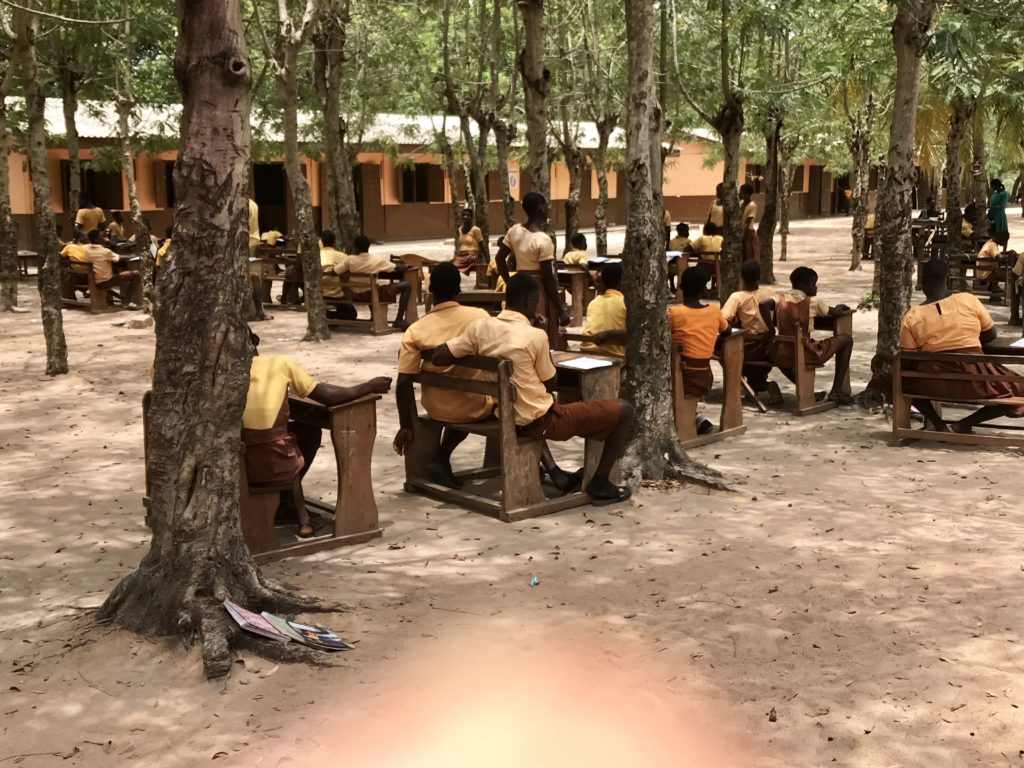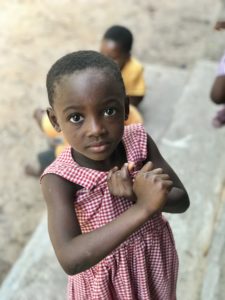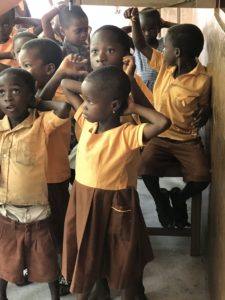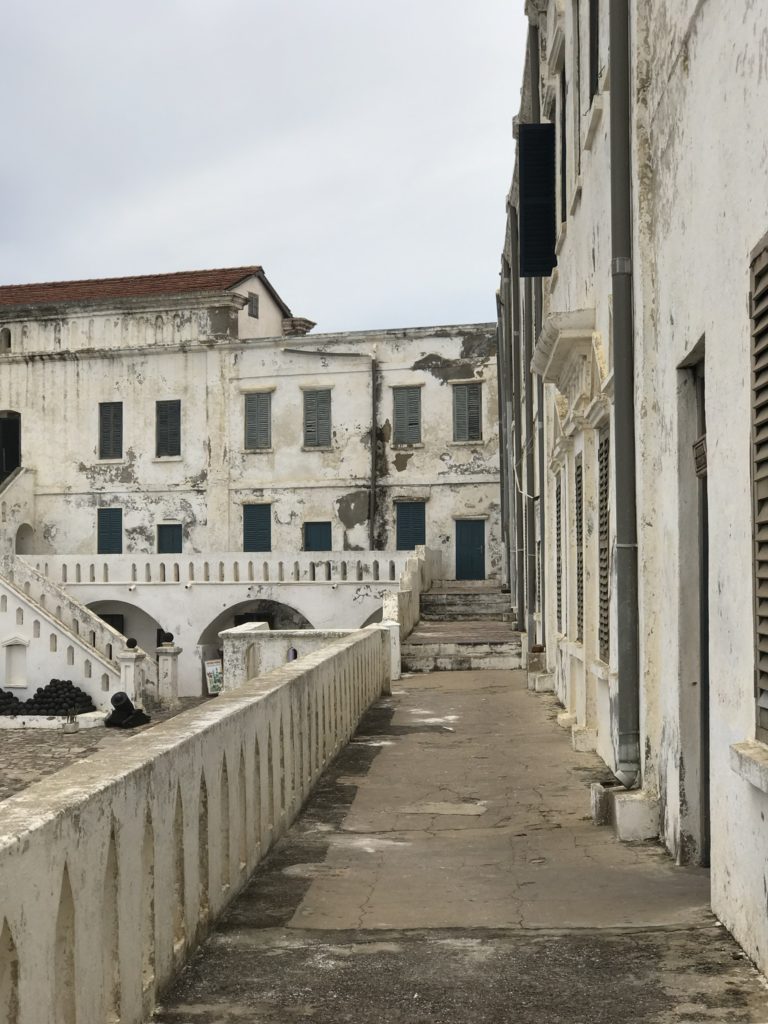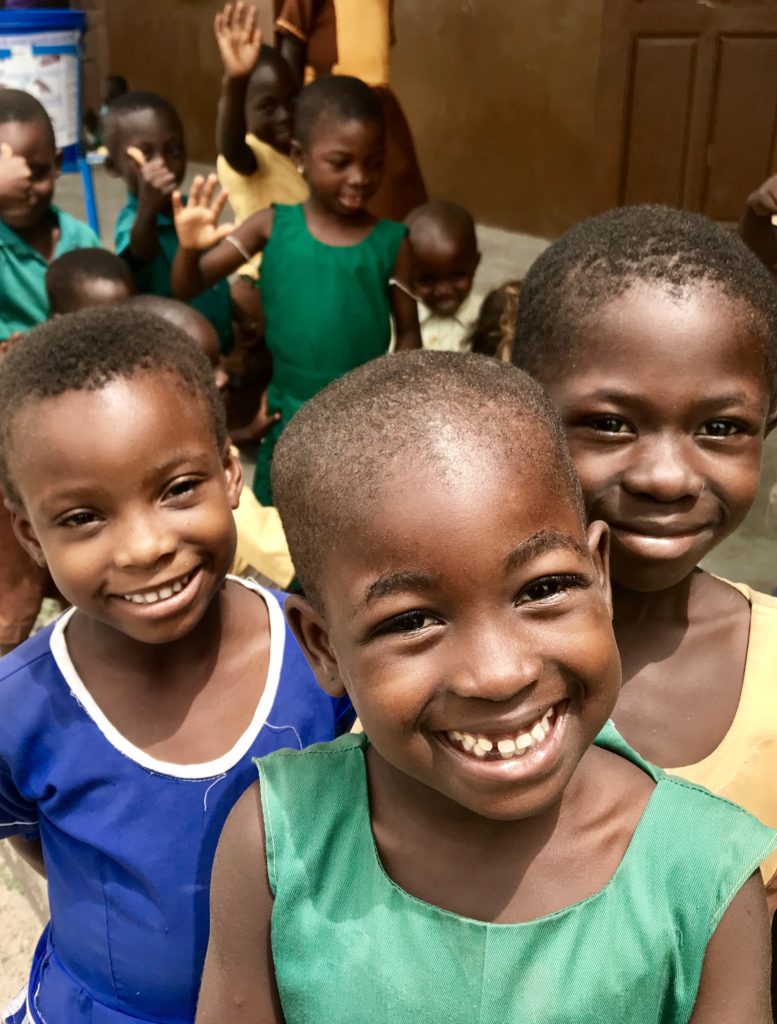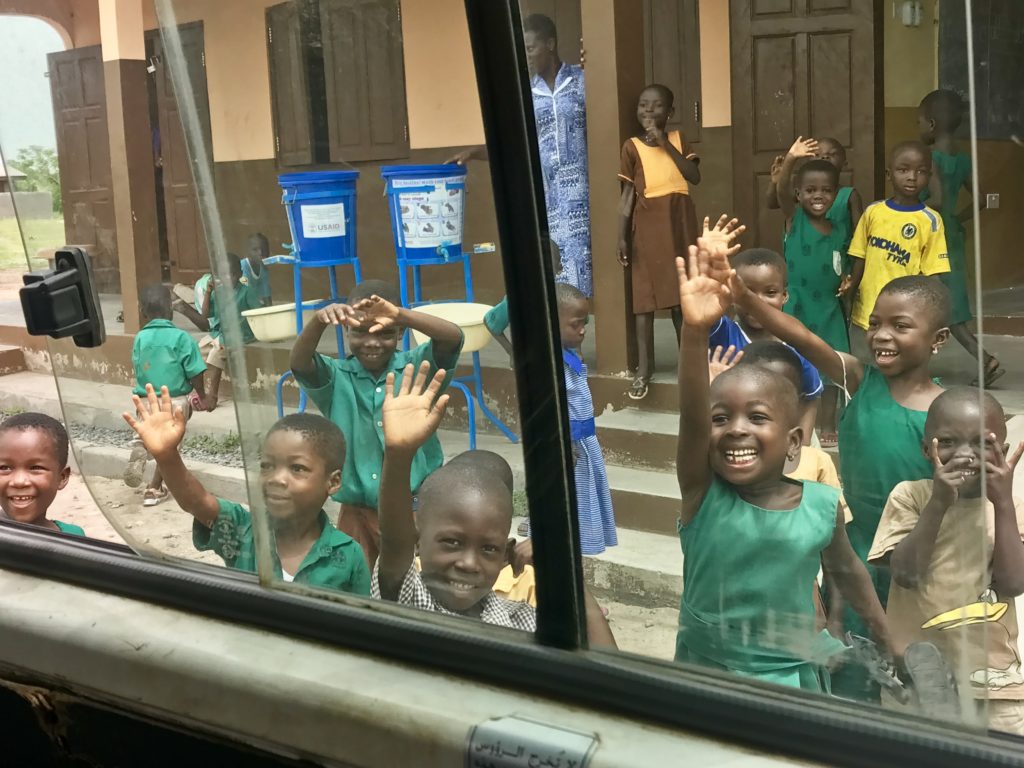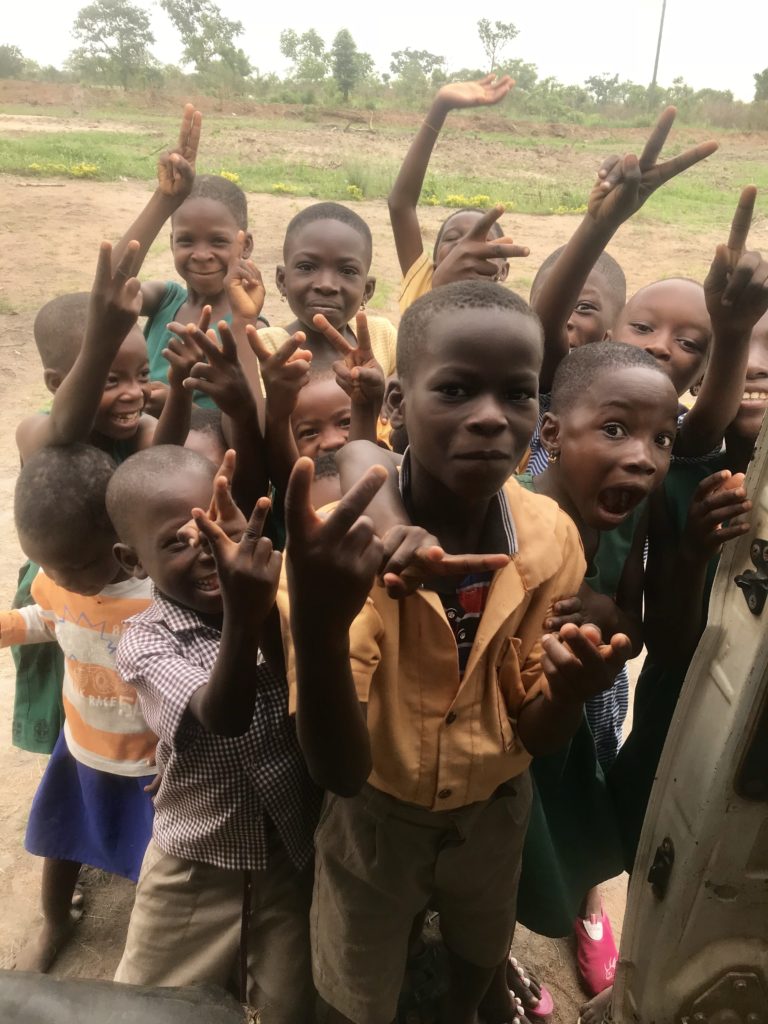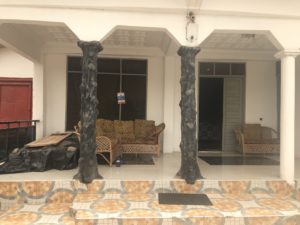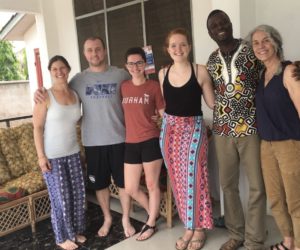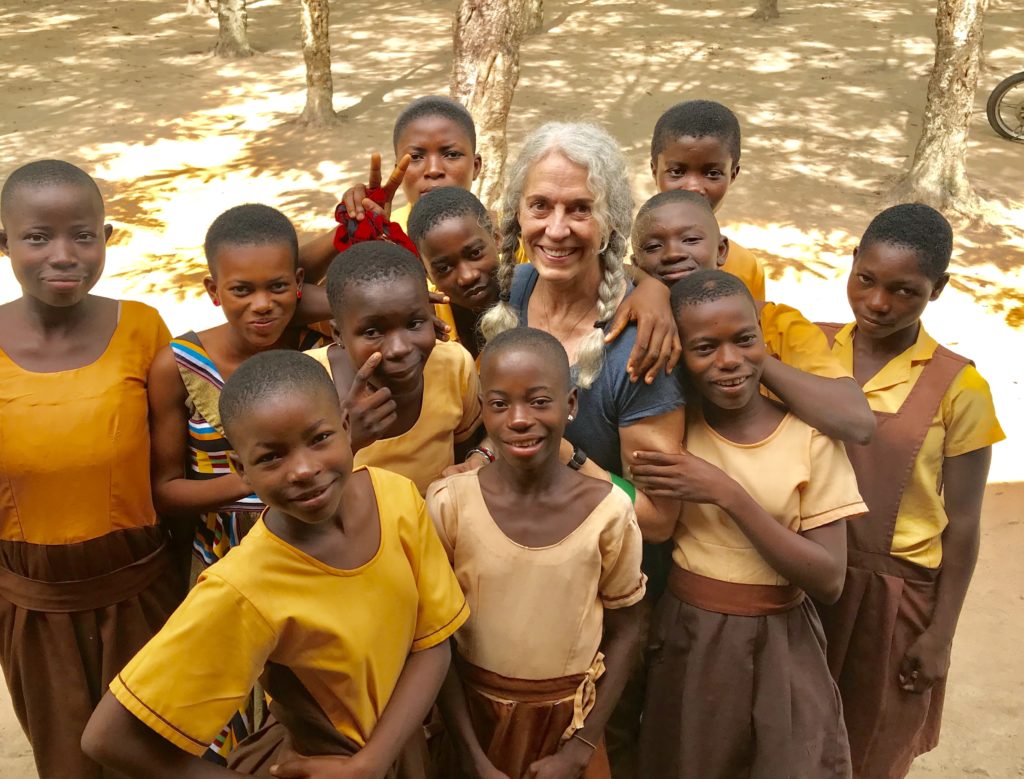
My two weeks volunteering in Ho, Ghana, was spent doing vision screenings at schools in 2 villages, 30 minutes from our home base. During that time we (5 of us the first week, 4 the second) screened:
331 people, including a half dozen or so teachers
21 failed the test, 2 of them teachers.
I was very pleased with the results, less than 7% failing, compared to our results in the refugee camps in Greece which was close to 20% failure. Those who failed will be seen by an eye doctor in the coming weeks and will be fitted for glasses.
We also did BMI’s on the children – none were overweight, but many were underweight.
Added to those numbers are the 50 or so school uniforms that we were able to piece back together with buttons, patches and a needle and thread, offering a bit more dignity to the wearer.
I’m very proud of how my time in Ghana was spent and the measurable difference we were able to make simply with a vision screening or a needle and thread. It’s easy to become overwhelmed by the tremendous sense of need when volunteering in developing countries, and although I feel very proud of what I accomplished, I’m also realistic and know that it is only a tiny drop in a vast ocean of need. It hasn’t been that long that Ghana has even been on my radar screen – its needs, its generous spirt, its beautiful children, but the curtain has now been pulled back, the same as it was during my time in the refugee camps in Greece, and I can’t unsee what I’ve seen or unexperience what I’ve experienced. It would be easier on my soul if I could. Hard as it is, I have to keep reminding myself that although it’s only a drop, that drop is a part of something much bigger, and collectively we really can make a difference.
I’m smack dab in the middle of my re-entry process, a process that is never easy for me, but one that I’ve come to embrace as it’s the time in my journey where the memories are still close enough to the surface that I feel like I’m straddling two universes. This is the time when I will wake up in the middle of the night, wondering why the fan is no longer blowing in my face or why I’m not tangling myself up in mosquito netting and why is it not unbearably hot? Without even giving it a thought, the first thing I did when I got home was turn up the heat in my house (despite the pleasant temperatures) and turn on the ceiling fan in my bedroom, which I rarely use. Re-entry. It’s slow for me and although we boarded 3 flights to get home, that soul of mine will hang back for a bit in Ghana, in a hot room with a blowing fan, and will visit me nightly in my dreams with nudges of, “not so fast there, Laurie, this is your absorption time. Don’t rush the process.” The time will eventually come when the suitcase is put away, the laundry done, and my coveted passport tucked away for safe keeping until the next time and life will return to its familiar place. I still have 4 more days of malaria pills to take though, and until that is complete, I still have one foot in Ghana.
I’m amused by how much I miss the things that initially I was so apprehensive about – the heat, oh my word, the heat! And sleeping under mosquito netting with a fan as close as I could get it to my bed, blowing directly into my face. I miss my campsite of a bed, tucking in at 7:30 or so every evening, while reading with a headlamp and eventually being lulled to sleep with the whir of my rotating fan. And my biggest surprise, and for reasons that this heat and humidity hating girl cannot explain, I miss the heat. Go figure. The one thing that I couldn’t stop complaining about my first few days there and now I feel its absence. As a non-sweater by nature, I discovered that a good sweat and frequent brow mops feel pretty darn good, earthy, teenaged-boy odor, and all.
I also miss the food, well most of it anyway. Because I have a gluten sensitivity, and have been advised by my doctor to avoid it, the pancakes and french toast that our cook would make for breakfast were off limits for me. Every morning he made me what looked like a thin omelette with diced red peppers that was rolled up burrito style. I was so pleased the first morning, feeling that my “special” breakfast outshined the pancakes or french toast options. 15 days later, my opinions changed and although I ate it without hesitation, the joy was replaced with nourishment needs. After leaving the home base, fellow volunteer, Lynette, and I spent a few days at a lovely boutique hotel in Accra before heading home. I was so excited to see a beautiful breakfast buffet laid out our first morning there, yet on closer inspection, I realized that, sadly, it was a gluten-laden feast with only one option for me. An omelet. And by choice, I requested red pepper only as my add on. Lynette laughed when she saw my breakfast choice after hearing my morning sighs at my daily, here we go again, omelette.
With the exception of our free time on weekends, my time and my purpose in Ghana was simple – doing vision screenings on the school children with the added bonus of uniform mending. When I wasn’t at the schools, I was immersing myself in the culture of Ghana through dancing and drumming, beading, a lesson in kente cloth weaving, Awe language lessons and even a visit with a witch doctor. My time felt clean and purposeful and held the same kind of amazement that I used to discover in my cultural anthropology classes, only this time they weren’t just stories. They were real and have become my stories that no doubt will be told and re-told for a long time. Stories about the beautiful children – the pure joy in their laughter, their enthusiastic welcomes and the curious hands that would gently touch my arm to see what white skin felt like.
As I process these experiences, during both my waking and sleeping hours, the one thing that continues to give me pause and brings a big smile to my face every time, is the children… the beautiful, sweet, kind children of Ghana. It is their sweet smiles and enthusiastic goodbyes as our van would pull away every day, that I will hold dearly. Those children, who have so little in material possessions but who have an abundance of joy and happiness in their spirits, were there to teach every one of us who worked with them a valuable lesson in what is important. It’s natural for me to come to my own conclusions about their happiness and well-being using my template of experience simply because that’s what I know. Initially, it was the visible scarcity that took my breath away – the small mud brick hovels that hardly seemed livable surrounded by piles of what I can only describe as broken – broken bicycles, tires, car parts and heaps of desk top monitors, or tv’s, I couldn’t tell which. It was an overwhelming entrance into where I would spend the next 2 weeks. When I met the children though, and saw their joy, their happiness and the strong sense of community they shared with one another, their abundance of spirit slowly softened the edges of the poverty that was so overwhelming on my drive in from the airport. I was stunned at how different that drive looked to me 2 weeks later, while I noticed the people in the villages, rather than their surroundings. Once again, time spent in a developing country, has given me the tremendous gift of gratitude for the gifts in my life that are so basic that I hardly see them as gifts… water, a solid shelter from weather and adequate food. Beyond the most basic of needs, our joy and happiness comes from a place within. This is an ongoing struggle for me that I face during my re-entries from developing countries. How do I find my comfortable balance between what I experienced and my own reality? I think it will be the faces of the children of Ghana as they come to mind, that will help me find that place of balance.
The inconveniences of not being able to flush toilet paper, not having hot water or water pressure in the shower, doing my laundry with two buckets rather than a washing machine and forgoing coffee for two weeks (yes, true story on that one…) were just that… inconveniences. Adaptation didn’t take long at all, and I got used to “showering” with a trickle of cool water and skipping the coffee for a cup of tea in the morning. I will say though, that the first cup of coffee and a real shower was pure heaven, something I never would have said a month ago. I no longer need the layer of mosquito deterring deet that I reluctantly applied to my skin every morning, or the fan and mosquito netting that turned my lower bunkbed into my night “camp.” No longer do I need to pay careful attention to the cultural sensitivity of which hand I use, a habit that was very hard to break initially, but one that kept me constantly in check, especially when I would hand items to the children during the testing. Lefty is back on board.
While I make my transition back, the feelings, the emotions, and the moments that tugged at my heart, will remain, with unexpected reminders of who I am, what I’m doing and a clearer picture of my place and my responsibility in the world.
The word Akpe in Awe means thank you and the syllable “ca” has the significance of adding emphasis to the word that precedes it, much like our “very” only with much more of a “more is more” significance. And so with that…
Akpe cacacacacacaca…. (and yes, that many “cas” would be totally acceptable). Your gracious welcoming of me to your country, I will always hold dear.

